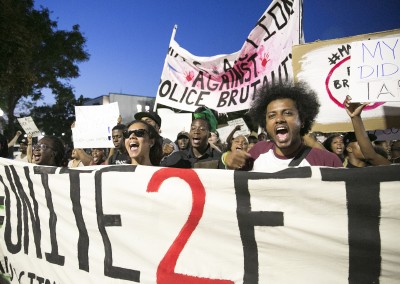
The group gathered around 7 p.m., decrying police officers’ acts of violence against civilians, with an emphasis on previous local incidents such as the deaths of Greater-Boston residents Usaama Rahim last June and Randolph McClain in February.
In his speech outside BPD headquarters, rally organizer and MAAPB member Brock Satter said the group demands the “arrest and charge [of] all officers in the Alton Sterling, Philando Castile and Alva Braziel cases” and law enforcement.
Sterling, a CD vendor, was shot by two policemen outside a Baton Rouge, Louisiana convenience store July 7 after having a confrontation with an officer. Castile, a school nutrition services supervisor, was shot July 8 in his car in Falcon Heights, Minnesota by an officer after police stopped Castile on robbery suspicion. Braziel, a 38-year-old who had faced several criminal charges, was shot by police July 9 in Houston, Texas, after being spotted standing on the middle of the street with a revolver.
“Remove all elected officials who justify racist police state terror,” Satter said. “Reopen past cases of state-sanctioned murders and reviewed by a special appointed prosecutor.”
Family members of those slain by police over the past few years then gave testimonies of their incidents.
The group marched on Tremont Street, Massachusetts Avenue and Dudley Station. Some members of surrounding neighborhoods also joined the march as the group passed by.
“Indict, convict, send those killer cops to jail!” the group shouted in a chant. “The whole damn system is guilty as hell!”
Nino Brown, a rally organizer and MAAPB member, said after the rally that the march represents unity against violence and killings by police.
“The march galvanized a lot of people who are oftentimes ignored, and we accomplished what we set out to do,” he said. “The march did not just pay attention to the killing of black people. [The police] kill people with impunity every single year.”
Brown said a two-tiered justice system that differentiates the proceedings of police’s criminal offenses from those of civilians is “fundamentally unjust” and contradicts the nature of democracy.
“If you are a police officer, and you commit a crime, you don’t get in trouble for it; whereas for civilians, you commit a crime, you would definitely get punishment,” he said.
The march ended about three hours later on Dudley Commons, adjacent to the MAAPB office. Protesters also stopped by Dudley Station, which Brown said serves a symbol of police-occupied “territory” that should be liberated.
The station had been the location of several police violence cases, such as the arrest of Mary Holmes, who called 911 after witnessing inappropriate treatment of an elderly woman by the Massachusetts Bay Transportation Authority Transit Police, but ended up being pepper-sprayed and hit by a baton. Holmes was present at the rally and gave a testimony at the beginning.
Mary Mastrorilli, a criminal justice professor at Boston University’s Metropolitan College, said police atrocities can be curbed by holding crime perpetrators accountable.
“I don’t believe that law enforcement is out of control, especially when you consider that there are about a million police officers patrolling our communities every day,” she said. “I think the Boston Police Department is an exceptionally professional department. I really believe that they put a number of procedures in place before they draw their gun and shoot.”
Several Boston residents voiced opposition toward police shootings of civilians, although their views on Boston police’s performance varied.
Heather Talley, 27, of Brighton, said educating the community on police’s role is crucial.
“It’s terrible, and at this point it’s not even shocking,” she said. “This continues to happen in our country, and very little seems to be done about it. I don’t have much interaction with the police … the police community has done very well.”
Debora Robinson, 47, of Jamaica Plain, said education and reducing socio-economic disparity are fundamental for reducing police violence.
“It’s another injustice; it’s really awful,” she said. “Our police don’t have the right raining — yes, definitely brutal. They apparently shoot someone at point-blank range and they shoot them multiple times when it’s not necessary.”
Denis Kyabaggu, 36, of Allston, said the cause of recent police shootings lies in racial stereotyping and called for more dialogues between communities to foster understanding.
“I think this is just a symptom of a bigger problem,” he said. “The police put this perception that the men are likely to be violent. As long as the stereotypes still exist, not demystified, those problems would still happen.”














































































































